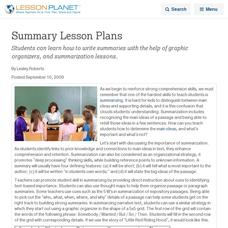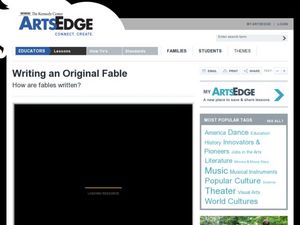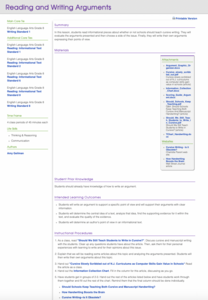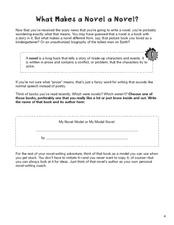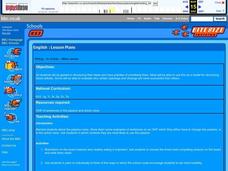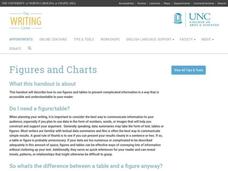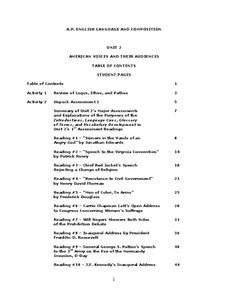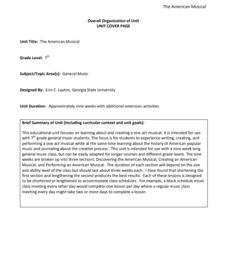Curated OER
Summary Lesson Plans
Students can learn how to write summaries with the help of graphic organizers, and summarization lessons.
Curated OER
Writing an Original Fable
Students discover how to write fables. In this writing skill lesson, students review the literary elements of fables and take all of the steps in the writing process to create their own fables.
University of North Carolina
Summary: Using it Wisely
Sometimes summarizing keeps a writer from going deeper into their analysis—don't fall into that trap. Learn the difference between summarizing and analyzing using an insightful resource. Focusing on introductions, the lesson shares...
Statistics Education Web
How High Can You Jump?
How high can your pupils jump? Learners design an experiment to answer this question. After collecting the data, they create box plots and scatter plots to analyze the data. To finish the activity, they use the data to draw conclusions.
Curated OER
Reading and Writing Arguments
Should schools continue to teach cursive writing? After reading and considering the merits of a series of arguments on both sides of this proposition, class members choose a side of the issue and craft their own argument, drawing support...
K12 Reader
Summarize It: President Theodore Roosevelt's 7th Annual Message to Congress
How did Theodore Roosevelt stress the importance of conservation during his time as president of the United States? Take a closer look at the language Roosevelt used himself in a 1907 address to Congress, and have your young historians...
Curated OER
House and Holmes: A Guide to Deductive and Inductive Reasoning
Test your pupils' reasoning skills with several activities and a quick mystery to solve. Learners watch and analyze a few video clips that demonstrate reasoning in action, practice deduction with an interactive and collaborative...
Curated OER
What Makes a Novel a Novel?
As your authors prepare to write a hypothetical novel, they need all the inspiration they can find! Using a book they have already read (and enjoyed), learners complete a literary analysis by filling in eight short-answer questions....
National History Day
Heroes Who Made a Difference: Memorializing a Distinguished Service Cross Award Recipient
Ever wonder how to memorialize World War I heroes in the classroom? Activities in a high-quality social studies resource prompt middle schoolers to research Internet sources, complete a graphic organizer, and write an editorial feature...
Scholastic
A Reading Guide to A Wrinkle in Time
Accompany a reading of Madeleine L'Engle's classic tale, A Wrinkle in Time, with a detailed guide equipped with 15 informative and useful chapters. Scholars discover who the author is, why she wrote the book, and crucial story elements...
Curated OER
Writing An Article
Young writers compose an article on the benefits of healthy eating. They are coached on how to use the passive voice in their writing. On the whiteboard, they brainstorm ideas of why healthy eating is important, then use those ideas to...
Museum of Tolerance
Making Lemonade: Responding to Oppression in Empowering Ways
An activity focused on tolerance encourages class members to consider how they might respond when they or someone else is the target of oppression and discrimination. After researching how some key figures responded to the anti-Semitism...
Penguin Books
A Teacher's Guide to The Omnivore’s Dilemma: A Natural History of Four Meals by Michael Pollan
"What should we have for dinner?" "What am I eating?" "Where did it come from?" These three questions are at the heart of Michael Pollan's The Omnivore's Dilemma: A Natural History of Four Meals. Pollan's book provides some very...
Columbus City Schools
To Measure its Mass or Volume?
Atoms, elements, and molecules, oh my! Teaching the fundamentals of chemistry to curious sixth graders has never been easier to accomplish. Here is a resource that pulls together everything needed to get them off to a good start,...
University of North Carolina
Figures and Charts
Sometimes words aren't the best way to get information across to the reader. The eighth handout in the 24-part Writing the Paper series describes different type of figures and charts to display complex information in a paper....
Florida Department of Environmental Protection
Water's Journey Expedition
Step into a scientist's shoes to go online and discover the Florida Springs Expedition, and participate in two activities focusing on how humans impact the environment. The first activity asks scholars to summarize the six dispatches at...
Northshore School District
American Voices and Their Audiences
Those new to teaching an AP level language and composition prep course and seasoned veterans will find much to treasure in a unit that is designed to help young language scholars develop the skills they need to analyze the language...
Curated OER
You Too Can Haiku: How to Write a Haiku
Students explore language arts by writing their own poems. In this haiku lesson, students investigate the Japanese culture and their beautiful music, poetry and art. Students count the syllables in every line of a haiku poem and write...
Curated OER
Using Color as a Pre-Writing Tool
To better understand how to compose a clear and well-organized paper, learners read short passages, write summaries, and make colored graphic organizers. This is a fully developed three-day lesson with suggested assessments.
Curated OER
Transition Words in Writing
Transition words in writing are the focus of the language arts lesson presented here. In it, learners cut out the word-sort cards (embedded in the plan), and put them into four categories: time, examples, space, and summary. They find a...
Los Angeles County Office of Education
Assessment For The California Mathematics Standards Grade 4
Have scholars show what they know with a 20-page assessment aligned to the California State Standards. The test covers concepts such as large and whole numbers, all four mathematical operations, fractions, decimals, geometric figures,...
Baruch College Writing Center
Summarizing, Paraphrasing, and Quoting Workshop
What's the difference between summarizing and paraphrasing? Show class members how to find the main ideas from informational text and condense it, restate it, or quote it directly with a series of educational activities based on two...
Johnny Mercer Foundation
The American Musical
General music students learn about the history of popular American music by creating and performing a one-act musical. After researching and creating an American Musical timeline, class members write a song with lyrics using Jam Studio,...
K20 Learn
Annotating a Text: Style and Syntax
New ReviewIf you have a favorite author, you probably recognize their style. Conduct a close read of the text, marking it up as they go. Collaborative sharing time and a summary writing prompt follow the main activity.


